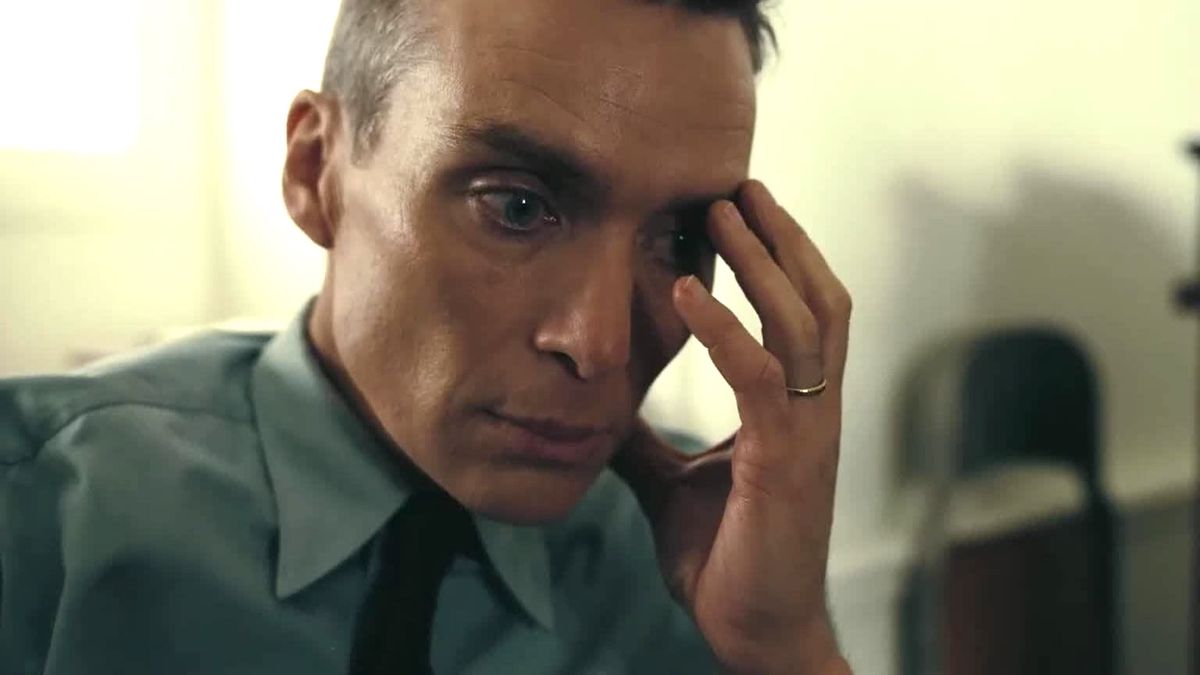I remember looking at all the social media reactions of critics and friends who had seen Oppenheimer, now up for a Best Picture Oscar. So many of them described walking out of the movie “devastated” and “depressed.” They said it was “all too true,” that they felt “destroyed” and that the movie would “haunt them for a long time.”
I found myself puzzled by these reactions and wondering what I was missing. Sure, the movie didn’t exactly end on a cheery note. It concludes with Oppenheimer, guilt-ridden over having destroyed so many Japanese lives with the atomic bomb, suggesting that by inventing the bomb, he and the allies “had” started a chain reaction that would destroy the world. The film then portrays his imagining the bomb destroying our world.
And yet … forgive me for stating the obvious, but I wanted to tell my friends: that never happened. One can forgive the terror that struck that generation in the face of what the Manhattan Project had wrought. But we have the benefit of hindsight. We’ve had the atomic bomb for decades and haven’t destroyed the world. (At least not yet.) It was in the earliest days of the Cold War, during, say, the Cuban Missile Crisis, that we came the closest, and yet … saner heads prevailed. From the Cold War to the Gulf War to the War on Terror, we have not destroyed the world. If anything, the fact that we’ve had the power to destroy the world hundreds of times over and haven’t should make us feel rather more optimistic than pessimistic about the future.
But that doesn’t seem to matter to some. The idea that our modern world and its institutions are hopelessly broken and that we’re on track to destroy ourselves any second now, either through nuclear war, overpopulation, the rise of fascism, AI, or climate change, is incredibly popular. So popular that it doesn’t seem to matter that it isn’t true.
The fact is that by most available metrics, the world is getting profoundly better. And this is happening because of our modern institutions—the institutions that Oppenheimer wants us to look at with cynicism—not in spite of them. We aren’t on the brink of destroying the world; we’re making real progress in restoring it.
WHY THE WORLD IS GETTING BETTER
Take poverty, for example. Poverty has been going down steadily since the advent of the Industrial Revolution, and is doing so at an accelerated rate, despite the constant growth in population, as laid out in the book by Ronald Bailey and Marian L. Tupy Ten Global Trends Every Smart Person Should Know. Fewer babies are dying or living in starvation. Incomes are rising around the world. The consensus from Baily and Tupy, as well as historians Mark Koyama and Jared Rubin in their book How the World Became Rich and among multidisciplinary experts like those described in “Bill Gates tweeted out a chart and sparked a huge debate about global poverty,” is that this is due to global capitalism, which has rapidly increased wealth around the world.
As for climate change, journalists and politicians constantly claim that we’re destroying our planet with our capitalistic greed. Young people are so convinced they won’t have a future that they’re refusing to have children and are becoming paralyzed with a condition so prevalent it’s been given a name: “Climate Anxiety.” And yet even some progressives are beginning to admit that climate change fears are overblown, and climate scientists are telling us our fears need to be moderated to an “important-but-not-world-ending” issue. Consider journalist Kelsey Piper’s “Stop telling kids that climate change will destroy their world” or Matthew Yglesias’ “People need to hear the good news about climate change.”
Even the fears that our democracy is always five seconds away from collapsing into civil war or dictatorship are overblown. Most of what truly threatens America we’ve faced and survived before. Forced vaccinations and the backlash? We’ve been there, back in 1898 with the smallpox vaccine, and the Republic has survived. Censorship? America has watched Supreme Court litigation over literal government censorship, such as in the 1971 fight over the Pentagon Papers (portrayed thrillingly by Steven Spielberg in his 2017 film, The Post). Now the fights are about what private businesses can or should do when it comes to regulating speech on their own platforms like Twitter (X) and YouTube, or “cancel culture,” which is about figuring out where the responsible line is in exercising our rights of freedom of association. Even the recent scandals around government entities pressuring private industries like Amazon to stop selling books about COVID-19 they disliked only highlight that the government has less power today to summarily force such censorship. Fears about religious liberty abound. And yet Supreme Court cases have upheld religious freedom over and over again. Oh, and we survived a literal Civil War that also brought chattel slavery to an end once and for all.
Murders are down both in America and, even more dramatically, around the world, according to studies published in Ten Global Trends, the New York Times’ “Crime on the Decline,” and Human Progress’ “Global Murder Rate Is Falling.” We’ve gone from a country with race-based slavery, to one with segregation, to one that outlawed both. We’ve elected a black president, and ever-rising rates of people support and enter into interracial marriages. Many young activists turned against peaceful protests in the 2020 because they believed they just weren’t working to affect change. And yet, as Vox’s “Black Lives Matter Activism Is Working” points out, the peaceful activism of the movement in years prior was having a real effect in lowering rates of police violence against black Americans. Those are huge bipartisan wins. Meanwhile, conservatives can celebrate the end of Roe v. Wade and the growing backlash against wokeism, cancel culture, and gender ideology. And liberals can celebrate more tolerance toward gay and lesbian Americans and the increasing concern even among many on the right regarding income inequality.
In almost every area, the liberal democratic institutions we’ve set up have helped us overcome more and more problems. It’s not that we don’t still have battles to wage. But the vast majority of problems are being ameliorated, not getting worse. And where they may be getting worse, the systems we’ve put into place and the technologies we’ve invented are giving us the tools to solve those problems. Social media and protections for free speech are giving rise to a plurality of voices. New technology is helping innovate ways to combat climate change. We’re winning, not losing. (OK, so maybe AI is the thing that finally gets us. But, as has been illustrated above, the doomsayers don’t have a great track record so far.)
WHY DO WE BELIEVE THE DOOMSAYERS?
The fact that so many people are convinced the world is ending—when it isn’t—has real-world consequences. It was those who were convinced that liberal democracy wasn’t working who burned cities in the summer of 2020 and who stormed the capitol on January 6. Those who believe we are destroying the world through fossil fuels are falling into depression and failing to have children, creating a real future underpopulation crisis (as for failed doomsayers, see Ehrlich, Paul).
So why, given all the data, are so many people pessimistic about the future?
There are several possible reasons, most likely a combination of all of them. The first is ignorance. Most people are not aware of the most recent data and know only what they see on the news and on social media, which are built to highlight the negative because that will grab your attention more than the positive and hopeful.
And why is that? As Dr. Mike Brooks, in his essay “Why It Feels like the End of the World Even When It’s Not,” points out, the human mind is engineered, if you will, to register negative things more intensely than it does positive things. This is a survival function, because it’s much more important to take note of the tiger in the bushes than the sweet berries. But that also means we’ll hear and absorb negative things about our world more readily than positive things. There are also political reasons for promoting a negative view of the world. As Matthew Yglesias argues, filmmakers like Adam McKay who spread “doom” messages about climate change do so partly because they want to inspire action. The problem is, they seem to be inspiring a lot of depression but very little action.
There are other possible explanations. Historian Niall Ferguson, author of the book Doom, suggested on Jordan Peterson’s podcast that we find the end of the world both comforting and exciting because we know that we’re going to inevitably die ourselves, and it makes our deaths feel more significant and “cinematic.” Yet sociologist Dr. Jonathan Haidt and neurologist Dr. Andrew Huberman have also suggested that we’re encouraging people to think in ways that will inevitably destroy their mental health, and therefore see the world more pessimistically. Jonathan Haidt argues in “Why the Mental Health of Liberal Girls Sank First and Fastest” that we’re teaching young people that encountering ideas that scare you leaves you permanently “traumatized,” which leads them to avoid those things, making them mentally weaker. Dr. Andrew Huberman likewise insists that depression increases when our emotions drive our thoughts rather than our thoughts determining our feelings. In an age when how things make us feel is becoming more and more important, it’s no surprise that depression is increasing.
THE GOD GAP
I believe there’s also a deeply religious reason for rampant pessimism. It’s worth noting that religion is nowhere to be found in Oppenheimer, except for a quotation from the Bhagavad Gita, which says more about Oppenheimer the man than it does Hinduism. When God doesn’t exist in your world, if the future depends on humans and you see how ridiculous and corrupt and politically motivated humans are, it’s hard to fathom a world that doesn’t inevitably end in disaster, despite what the data might show. An imagination shaped by a godless conception of the world makes positive data more difficult to stick or feel believable.
And the data on religion and mental health supports this idea. As sociologist Ryan Burge wrote in “Political Ideology, Religious Attendance, and Mental Illness,” being religious is one of the most important factors determining whether someone enjoys good mental health—even controlling for other factors. Likewise, even Scientific American noted in “Psychiatry Needs to Get Right with God” that, during the pandemic, the only people whose mental health didn’t decline, but actually got better—let me repeat, got better—were Americans who went to church at least three times a month. This held true whether that was in-person or virtual services, which meant it was the broader narrative they were ingesting that affected them, not just the community.
The stories we tell about ourselves profoundly affect what we believe and remember. The West has largely given up the Christian story about how it is the eternal Word of God made man who holds the world in his hands (Hebrews 1:3), for one where—as the movie says—J. Robert Oppenheimer is the most important man who ever lived.
It’s vitally important that we tell ourselves a story about our world that makes us excited to discover the truth, and believe and remember it. If we’re convinced that the “truth” will only make us miserable, then truth will always pay the price. And we may end up creating the dark future we were convinced we were already making in the first place.

